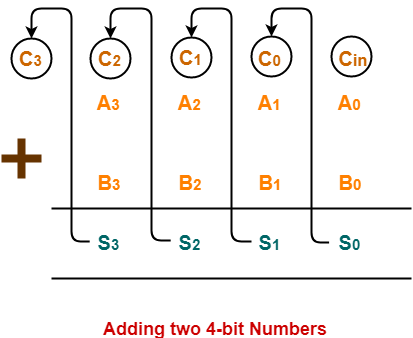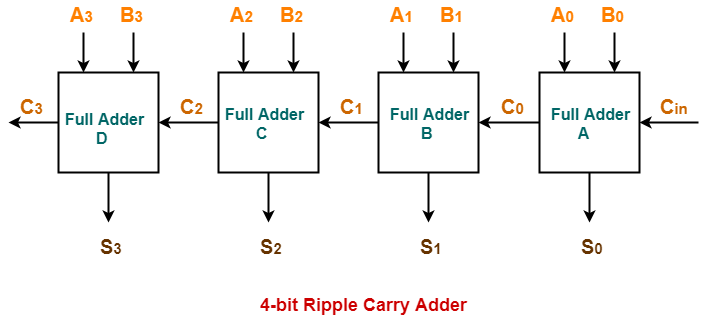Ripple Carry Adder-
- Ripple Carry Adder is a combinational logic circuit.
- It is used for the purpose of adding two n-bit binary numbers.
- It requires n full adders in its circuit for adding two n-bit binary numbers.
- It is also known as n-bit parallel adder.
4-bit Ripple Carry Adder-
| 4-bit ripple carry adder is used for the purpose of adding two 4-bit binary numbers. |
In Mathematics, any two 4-bit binary numbers A3A2A1A0 and B3B2B1B0 are added as shown below-

Using ripple carry adder, this addition is carried out as shown by the following logic diagram-

As shown-
- Ripple Carry Adder works in different stages.
- Each full adder takes the carry-in as input and produces carry-out and sum bit as output.
- The carry-out produced by a full adder serves as carry-in for its adjacent most significant full adder.
- When carry-in becomes available to the full adder, it activates the full adder.
- After full adder becomes activated, it comes into operation.
Also Read- Full Adder Working
Working Of 4-bit Ripple Carry Adder-
Let-
- The two 4-bit numbers are 0101 (A3A2A1A0) and 1010 (B3B2B1B0).
- These numbers are to be added using a 4-bit ripple carry adder.
4-bit Ripple Carry Adder carries out the addition as explained in the following stages-
Stage-01:
- When Cin is fed as input to the full Adder A, it activates the full adder A.
- Then at full adder A, A0 = 1, B0 = 0, Cin = 0.
Full adder A computes the sum bit and carry bit as-
Calculation of S0–
S0 = A0 ⊕ B0 ⊕ Cin
S0 = 1 ⊕ 0 ⊕ 0
S0 = 1
Calculation of C0–
C0 = A0B0 ⊕ B0Cin ⊕ CinA0
C0 = 1.0 ⊕ 0.0 ⊕ 0.1
C0 = 0 ⊕ 0 ⊕ 0
C0 = 0
Stage-02:
- When C0 is fed as input to the full adder B, it activates the full adder B.
- Then at full adder B, A1 = 0, B1 = 1, C0 = 0.
Full adder B computes the sum bit and carry bit as-
Calculation of S1–
S1 = A1 ⊕ B1 ⊕ C0
S1 = 0 ⊕ 1 ⊕ 0
S1 = 1
Calculation of C1–
C1 = A1B1 ⊕ B1C0 ⊕ C0A1
C1 = 0.1 ⊕ 1.0 ⊕ 0.0
C1 = 0 ⊕ 0 ⊕ 0
C1 = 0
Stage-03:
- When C1 is fed as input to the full adder C, it activates the full adder C.
- Then at full adder C, A2 = 1, B2 = 0, C1 = 0.
Full adder C computes the sum bit and carry bit as-
Calculation of S2–
S2 = A2 ⊕ B2 ⊕ C1
S2 = 1 ⊕ 0 ⊕ 0
S2 = 1
Calculation of C2–
C2 = A2B2 ⊕ B2C1 ⊕ C1A2
C2 = 1.0 ⊕ 0.0 ⊕ 0.1
C2 = 0 ⊕ 0 ⊕ 0
C2 = 0
Stage-04:
- When C2 is fed as input to the full adder D, it activates the full adder D.
- Then at full adder D, A3 = 0, B3 = 1, C2 = 0.
Full adder D computes the sum bit and carry bit as-
Calculation of S3–
S3 = A3 ⊕ B3 ⊕ C2
S3 = 0 ⊕ 1 ⊕ 0
S3 = 1
Calculation of C3–
C3 = A3B3 ⊕ B3C2 ⊕ C2A3
C3 = 0.1 ⊕ 1.0 ⊕ 0.0
C3 = 0 ⊕ 0 ⊕ 0
C3 = 0
Thus finally,
- Output Sum = S3S2S1S0 = 1111
- Output Carry = C3 = 0
Why Ripple Carry Adder is Called So?
In Ripple Carry Adder,
|
Disadvantages of Ripple Carry Adder-
- Ripple Carry Adder does not allow to use all the full adders simultaneously.
- Each full adder has to necessarily wait until the carry bit becomes available from its adjacent full adder.
- This increases the propagation time.
- Due to this reason, ripple carry adder becomes extremely slow.
- This is considered to be the biggest disadvantage of using ripple carry adder.
To overcome this disadvantage, Carry Look Ahead Adder comes into play.
To gain better understanding about Ripple Carry Adder,
Next Article- Delay in Ripple Carry Adder
Get more notes and other study material of Digital Design.
Watch video lectures by visiting our YouTube channel LearnVidFun.

